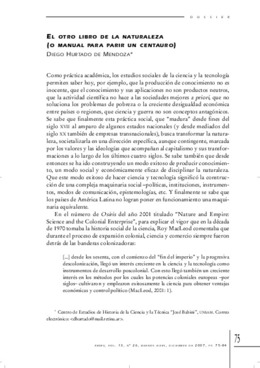El otro libro de la naturaleza (o manual para parir un centauro)
Abstract
Como práctica académica, los estudios sociales de la ciencia y la tecnología permiten saber hoy, por ejemplo, que la producción de conocimiento no es inocente, que el conocimiento y sus aplicaciones no son productos neutros, que la actividad científica no hace a las sociedades mejores a priori, que no soluciona los problemas de pobreza o la creciente desigualdad económica entre países o regiones, que ciencia y guerra no son conceptos antagónicos. Se sabe que finalmente esta práctica social, que “madura” desde fines del siglo XVII al amparo de algunos estados nacionales (y desde mediados del siglo XX también de empresas transnacionales), busca transformar la naturaleza, societalizarla en una dirección específica, aunque contingente, marcada por los valores y las ideologías que acompañan al capitalismo y sus transformaciones a lo largo de los últimos cuatro siglos. Se sabe también que desde entonces se ha ido construyendo un modo exitoso de producir conocimiento, un modo social y económicamente eficaz de disciplinar la naturaleza. Que este modo exitoso de hacer ciencia y tecnología significó la construcción de una compleja maquinaria social – políticas, instituciones, instrumentos, modos de comunicación, epistemologías, etc. Y finalmente se sabe que los países de América Latina no logran poner en funcionamiento una maquinaria equivalente. As an academic practice, the social studies of science and technology allow us to know today, for example, that the production of knowledge is not innocent, that knowledge and its applications are not neutral products, that scientific activity does not make societies better. a priori, that it does not solve the problems of poverty or the growing economic inequality between countries or regions, that science and war are not antagonistic concepts. It is known that finally this social practice, which "matures" since the end of the 17th century under the protection of some national states (and since the mid-20th century also of transnational companies), seeks to transform nature, societalize it in a specific, although contingent, direction, marked by the values and ideologies that accompany capitalism and its transformations over the last four centuries. It is also known that since then a successful way of producing knowledge, a socially and economically effective way of disciplining nature, has been built. That this successful way of doing science and technology meant the construction of a complex social machinery – policies, institutions, instruments, modes of communication, epistemologies, etc. And finally, it is known that Latin American countries are unable to put equivalent machinery into operation.

